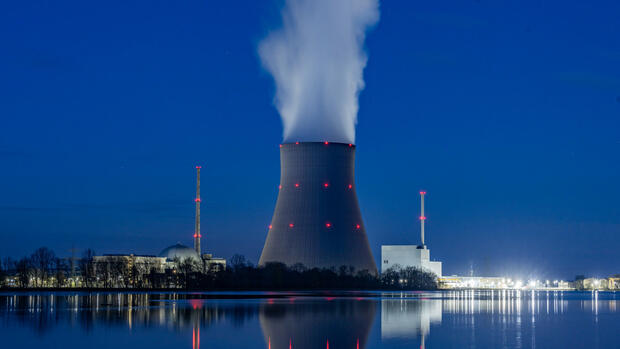Steam rises from the cooling tower of the Isar 2 nuclear power plant. According to the Atomic Energy Act, the power plant is to be shut down for good on April 15.
(Photo: dpa)
Berlin Even after the shutdown of the last three nuclear power plants in Germany on April 15, a German company continues to produce nuclear power.
The energy group Uniper, which was nationalized in the course of the gas crisis, has a stake in three nuclear power plants in Sweden, in one of them as the majority owner. “Uniper has 1.4 gigawatts of attributable nuclear power capacity in Sweden, which obtains around 40 percent of its electricity from nuclear energy,” says the Düsseldorf-based company’s website. 1.4 gigawatts (1400 megawatts) correspond to the gross output of the RWE nuclear power plant in Emsland, which is about to be shut down.
“There are no plans to part with nuclear power plants in Sweden,” said a Uniper spokesman when asked by the German Press Agency. “Uniper is a reliable operator of its nuclear power plants in Sweden and does everything possible to ensure safe operation,” said the spokesman.
Uniper is currently planning to construct an electrical, non-nuclear research and test facility at the site of the nuclear power plant in Oskarshamn, construction of which should start next year. The project will be carried out in cooperation with the Blykalla company and the Royal Institute of Technology. The research facility will be used to test materials and components for a new type of reactor, a so-called Small Modular Reactor (SMR).
The aim is to develop a reactor “that can continue to supply fossil-free electricity to industry and society in a stable, cost-efficient and climate-friendly manner,” says a Uniper information page.
Uniper relies on small reactors – scientists are skeptical
“What distinguishes an SMR from today’s large nuclear power plants is that it can supply the same amount of stable and fossil-free electricity as it does today, but is more flexible and takes up less space.” The concept envisages that the components would be prefabricated and transported to the site .
There they would then be put together like a “do-it-yourself kit”. Due to the serial production, the costs and time required for the construction of an SMR are significantly lower than for a large nuclear power plant. The “Frankfurter Allgemeine Zeitung” had previously reported on Uniper’s plans in Sweden.
The nationalized German energy group Uniper also has stakes in several nuclear power plants in Sweden.
(Photo: AP)
The German Institute for Economic Research (DIW) recently expressed its disapproval of SMR systems, which are understood to mean reactors with an electrical output of up to 300 megawatts. According to a study, SMR concepts are not mature and will not be available in the foreseeable future. These were old reactor concepts that would not have established themselves due to the economic disadvantages caused by the lower outputs. “Furthermore, they remain radiologically dangerous, as the problems of increased transport and interim storage of radioactive waste would multiply.”
Despite decades of research, hardly any nuclear power plant in the SMR category has been able to start commercial power operation. Even assuming optimistic framework conditions, a cost-competitive offer cannot be assumed.
More: What to do with the radioactive waste from nuclear power plants?
